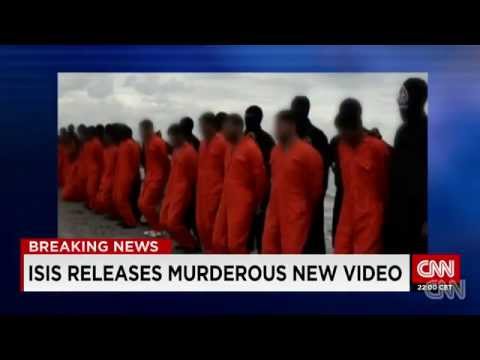ISIS sent a message last week: “Message signed in blood to the nation of the cross.” Twenty-one Christians slaughtered on the beach. Did you see it?
 They said they were “chopping off the heads of those that have been carrying around the cross illusion in their heads.” That’s me and my family. My church. Their message is for us.
They said they were “chopping off the heads of those that have been carrying around the cross illusion in their heads.” That’s me and my family. My church. Their message is for us.
They beheaded 21 Egyptian Christian brothers as an act of Worship to Allah.
And the 21 died with prayers on their lips to Jesus. “Lord Jesus Christ,” they called out. “Yeshua!”
And we can feel powerless. Our military might ensnarled in tribal rivalries and ancient disagreements over the legitimate successor to Mohammed (Sunni vs. Shia).
I heard Bill O’Reilly sign off of an interview with Rev. Franklin Graham, head of Samaritan’s Purse, saying, “Yes, I hear you saying we need prayer…but we also need power.” And once again he called for more military intervention in the situation.
As you watch the horrors of ISIS unfold on your TV, do you look to military might to end them? Are we praying? Are our churches praying? How should we pray?
The apostle Paul tells us that “our struggle is not against flesh and blood, but against…the spiritual forces of evil in the heavenly realms” (Ephesians 6:12). This is particularly true in any attempt to defeat ISIS. Because ISIS, more than any enemy in recent memory, has founded its identity on its religion. It draws its legitimacy from texts in the Koran. And a theological understanding of its identity and mission are crucial if we want to defeat it.
What does ISIS believe?
First, like all Muslims they believe the Qu’ran. Written by the prophet Mohammed more than 600 years after the completion of the New Testament, the Qu’ran denies the Fatherhood of God, the deity of Jesus and the crucifixion and atoning death of Jesus.
It teaches: if you confess there is no God but Allah and Mohammed is his prophet, if you pray toward Mecca five times a day, if you give alms to the poor, if you fast during the month of Ramadan and make a pilgrimage to Mecca, then these are the works that make it most likely that you will be pleasing to God at the Last Judgment and be rewarded with paradise.
Does the Qu’ran endorse using violence to compel submission to Islam and Islamic rule? Read the following verses:
Qur’an 48:29—Muhammad is the Messenger of Allah, and those who are with him are severe against disbelievers, and merciful among themselves.
Qur’an 5:33—The punishment of those who wage war against Allah and His apostle and strive to make mischief in the land is only this, that they should be murdered or crucified or their hands and their feet should be cut off on opposite sides or they should be imprisoned; this shall be as a disgrace for them in this world, and in the hereafter they shall have a grievous chastisement.
Qur’an 9:29—Fight those who believe not in Allah nor the Last Day [notice it does not say “fight people who are attacking you”], nor hold that forbidden which hath been forbidden by Allah and His Messenger, nor acknowledge the Religion of Truth, from among the People of the Book [the people of the book are Jews and Christians], until they pay the Jizyah [a tax on unbelievers] with willing submission, and feel themselves subdued.
There are many more verses like this. There are also verses that call for respect for “People of the Book” and show much more leniency to unbelievers. These are the verses that seem to say that Islam is a religion of peace. So does Islam endorse violence against outsiders?
The Islamic teaching of Abrogation
The Koran was written by Mohammed over the course of his lifetime, beginning with sections that were written when he was unknown and powerless. Those are the verses that show more mercy to unbelievers.
As Mohammed grew in fame and power he encountered more opposition. The Koran became more polarized and aggressive toward unbelievers. The passages above that condone violence toward unbelievers are from the older/more recent suras or chapters of the Qu’ran.
To clarify the many inconsistencies between older suras/chapters of the Qu’ran and newer suras, we can read the teaching of “Abrogation” in sura 2:106—”Whatever communications We abrogate or cause to be forgotten, We bring one better than it or like it. Do you not know that Allah has power over all things?” Without this teaching the Koran is quite self-contradictory.
Al Queda and ISIS believe that this teaching of abrogation justifies their aggression towards infidels. They disregard the older, more peaceful verses and use the more recent ones as their theological foundation.
ISIS contends that its interpretation of the Qu’ran is the only true interpretation. The Islamic theological establishment condemns and denies it. Even Al Queda denies it. But thousands of recruits from around the world are joining up.
Atlantic Monthly’s thoughtful analysis of ISIS’ beliefs and mission
Last week Graeme Wood wrote an Atlantic Monthly piece entitled “What ISIS Really Wants.” It quickly became the most-read source on what ISIS believes. In it Wood wrote, “Muslims who call the Islamic State un-Islamic are typically, as the Princeton scholar Bernard Haykel, the leading expert on the group’s theology, told me, ’embarrassed and politically correct, with a..view of their own religion that neglects what their religion has historically and legally required.'”
Wood went on to describe the eschatology of ISIS: “…there will be only 12 legitimate caliphs, and Baghdadi is the eighth; that the armies of Rome will mass to meet the armies of Islam in northern Syria; and that Islam’s final showdown with an anti-Messiah will occur in Jerusalem after a period of renewed Islamic conquest.”
Wood reports that one spokesperson for ISIS added that “the caliphate will expand and sack Istanbul. Some believe it will then cover the entire Earth, but Cerantonio suggested its tide may never reach beyond the Bosporus. An anti-Messiah, known in Muslim apocalyptic literature as Dajjal, will come from the Khorasan region of eastern Iran and kill a vast number of the caliphate’s fighters, until just 5,000 remain, cornered in Jerusalem. Just as Dajjal prepares to finish them off, Jesus—the second-most-revered prophet in Islam—will return to Earth, spear Dajjal, and lead the Muslims to victory.
What it will take to defeat ISIS
Wood’s analysis
So how do you defeat an army that believes that it’s victories in battle and beheadings of innocents are an act of worship? A fulfillment of prophecy that takes them closer to their own deaths and paradise beyond it?
Woods concludes his analysis, ” Given everything we know about the Islamic State, continuing to slowly bleed it, through air strikes and proxy warfare, appears the best of bad military options….
“[ISIS] is ready to cheer its own near-obliteration, and to remain confident, even when surrounded, that it will receive divine succor if it stays true to the Prophetic model. Ideological tools may convince some potential converts that the group’s message is false, and military tools can limit its horrors. But for an organization as impervious to persuasion as the Islamic State, few measures short of these will matter, and the war may be a long one, even if it doesn’t last until the end of time.”
Biblical wisdom
What is more powerful–military might or prayer? Military might is powerful. Especially if you’re watching an airshow over the Cooper River in Charleston and a fighter jet comes screaming in suddenly  from behind you. It’s terrifying. Even when it’s friendly.
from behind you. It’s terrifying. Even when it’s friendly.
We can rely on our military to destroy our enemies in head to head combat and I’m so grateful for their service and sacrifice. We shouldn’t roll over when evil is threatening us. But who are we ultimately relying on for protection?
God clearly says, “Woe to those who…rely on horses, who trust in chariots because they are many and in horsemen because they are very strong, but do not look to the Holy One of Israel or consult the LORD!”
It boggles the mind and confounds the pundits that here we are in the 21st century fighting a religious war. It’s hard to admit that history just might be moving toward a final battle to be fought in the mid-east. That prayer might be more powerful than platoons.
But prayer brings the power of heaven into the circumstances of earth. So rather than watch their videos and listen to the pundits and let the dark clouds of dread roll in, let’s look to our sovereign God on his throne.
Let’s pray to defeat ISIS at the table before dinner. Ask our churches to pray. And make it a daily part of our intercession.
Let’s pray for God’s justice for those who believe the illusion of a triumphant caliphate that Jesus will lead to victory. That God’s Spirit would expose the lies of the teachings and prophecies that motivate them. That as they see the slaughter of the innocent that they would be moved to search deeper into their own Scripture to see how it is being perverted.
Let’s pray with army chaplain O’Neill at the Battle of the Bulge that “”we may advance from victory to victory, and crush the oppression and wickedness of our enemies and establish Thy justice among men and nations.”
Let’s join the voices in Revelation 6…”I saw under the altar the souls of those who had been slain for the word of God and for the witness they had borne. They cried out with a loud voice, “O Sovereign Lord, holy and true, how long before you will judge and avenge our blood on those who dwell on the earth?”
Let’s also pray for mercy. That God would open the eyes of the unbelievers of ISIS who persecute our brothers and sisters in Christ. That they would realize that they have a Father who loves them and a Savior who died for them.
That they do not have to earn their way to heaven with crucifixions and beheadings and slavery. But that they can receive forgiveness as a free gift.
Oh God, be merciful to me, a sinner. And to the people of ISIS too.

Very good: a balanced and thoughtful account of, and approach to, Islam today. Yes, Lord, help us ALL.
Thank you Lorraine. I’m joining you in prayer for them and us.